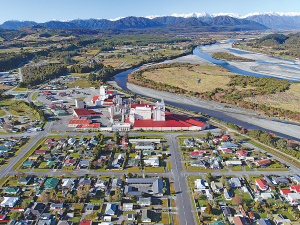Strong growth for Yili's NZ operations
Chinese dairy giant Yili Group says its New Zealand operations are on track for strong revenue growth in 2025 after recording significant year-on-year growth for the first half of the year.
 Westland Milk recently did a carbon footprint assessment of their plant in Hokitika whichs shows emissions have reduced since the last report in 2017-18.
Westland Milk recently did a carbon footprint assessment of their plant in Hokitika whichs shows emissions have reduced since the last report in 2017-18.
Setting a regulation in place often disengages certain people rather than appealing to their motivation to act.
That's the view of Olivia Berry, head of strategy and sustainability at Yili/Westland Milk Products, who recently attended the Agricultural Climate Change conference. She says one of the lessons from the conference was to find the best way to incentivise farmers to deal with agricultural emissions and other environment-related matters.
She says the message came through that farmers should be allowed to do what was necessary, with support through tools and new information.
She says Westland Milk recently did a carbon footprint assessment of their plant in Hokitika which shows emissions have reduced since the last report in 2017-18.
"The draft version of that report is showing a 19% reduction in our carbon dioxide emissions, which is pretty exciting."
Westlnd also reduced coal use by 20% in the past seasn compared with the previous season - equivalent to 11,000 tonnes of coal not burned, she says.
Berry says Westland also reduced energy consumption by 22% "across the board", a lot of which was done in conjunction with the Government Investment in Decarbonising Industry (GIDI) Fund.
She says they have done process heat reduction programmes and changed the way the company moves milk around the country.
"That's been about working with transport companies on improving efficiency on moving product from our Hokitika plant across to Christchurch and then overseas," she says.
Up until now it has focused mainly on reducing emissions at its factory but it has done some limited work with its farmers.
Berry says all their supplier farmer now have their greenhouse gas emissions reports and Westland's own farm excellence programme talks about reducing emissions.
She says their company is now developing focus farms and keeping a watching brief on the likes of what Fonterra and the other dairy companies are doing in regenerative agriculture. She says key to this is looking at what we mean by regenerative agriculture from an NZ perspective.
"We talk about improving biodiversity on farm and the question often asked is, what does this mean to a farm that already has a very high level of biodiversity and is there a need to keep continuing increasing that?"
Berry says farmers who are already doing a good job in this area need to be rewarded.
Voting has started for the renewal of DairyNZ's milksolids levy.
The most successful catchment groups in NZ are those that have 'a source to sea' approach.
Associate Agriculture Minister and Manawatu dairy farmer Andrew Hoggard says the free trade agreement (FTA) negotiated with India is not a bad deal and his party, Act, will support it when it goes before Parliament.
Newly released data from Environment Canterbury (ECan) Farm Environment Plan (FEP) audits are showing a dramatic lift in environmental performance across the region.
A solid recovery of global dairy prices this year makes a $9.50/kgMS milk price almost a shoo-in for this season.
As New Zealand marks the United Nations’ International Year of the Woman Farmer 2026 (IYWF 2026), industry leaders are challenging the misconception that women only support farming.
OPINION: Fonterra may be on the verge of selling its consumer business in New Zealand, but the co-operative is not…
OPINION: What does the birth rate in China have to do with stock trading? Just ask a2 Milk Company.